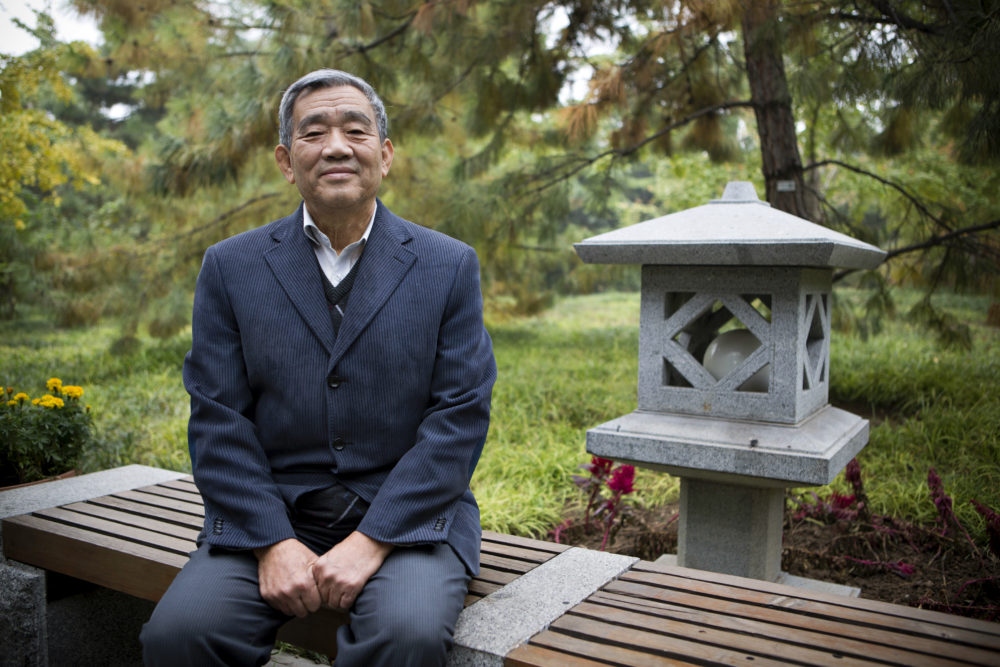CAMBRIDGE, Mass. – In recognition of his ambitious and fearless reporting, Nieman Fellows in the class of 2016 at Harvard University have selected Chinese journalist and author Yang Jisheng for the Louis M. Lyons Award for Conscience and Integrity in Journalism.
Yang’s groundbreaking book Tombstone: The Great Chinese Famine 1958-1962 documents in forensic detail the true scale of one of the greatest human catastrophes of the 20th century. It is a grim and sobering account of the Great Leap Forward policy implemented under Mao Zedong, which led to the death of some 36 million Chinese, primarily by starvation but also torture and murder. Banned in China, Tombstone has won numerous honors including the 2013 Hayek Book Prize and the 2015 Stieg Larsson Prize as well as a 2008 Hong Kong book award and a 2015 award from the Independent Chinese PEN Center for the Chinese language version of the book.
In a statement, the Nieman Fellows said: “Yang’s work speaks to the effort of every journalist globally who faces enormous obstacles in reporting. Now more than ever the world needs courageous and dedicated journalists like Mr. Yang. He is a role model to all who seek to document the dark and difficult struggles of humankind.”
As a reporter for China’s official Xinhua News Agency, Yang spent most of his career working inside the system. However when China’s Communist Party sought to suppress information about the death toll of the 1958-1962 famine and officially cited natural disasters and the Sino-Soviet split as two key causes, he refused to remain silent.
In 2008, Yang published the results of a decade-long investigation into the events of those years, meticulously documenting the deaths of millions of his countrymen and identifying Mao’s misguided policies and the country’s totalitarian political system as the root causes for the disaster. He named the book Tombstone not only to commemorate the massive loss of lives half a century ago but also in reference to his own career, anticipating possible persecution for his work. While that did not come to pass, his book is still not available in China.
“Through the determination and commitment required for this project, Mr. Yang clearly demonstrates the qualities of conscience and integrity. He provides inspiration to all who seek to document the truth in the face of influences, forces and regimes that may push against such transparency,” the Nieman Fellows said in their award citation.
After retiring from the official Xinhua News Agency as a national correspondent in 2001, Yang helped edit Yan Huang Chun Qiu (Chronicles of History), an influential reformist journal known for its independent reporting on the history of China’s Communist Party. He resigned from the publication in July under official pressure to do so.
The Louis M. Lyons Award will be presented to Yang at the Nieman Foundation for Journalism in the spring of 2016.
The Nieman class of 1964 established the Louis M. Lyons Award in honor of the Nieman Foundation curator who retired that year after leading the institution for a quarter of a century. Lyons was a forceful advocate for freedom of the press. While he was curator of the Nieman Foundation, he broke new ground by diversifying the class of fellows to include women, minorities, and international fellows. The award honors displays of conscience and integrity by individuals, groups or institutions in communications. The winner is chosen each year by the members of the Nieman class. The 2016 class is composed of 23 journalists representing 12 nations, including Zimbabwe, China, Turkey, England, Israel, the Netherlands, Brazil, Australia, Canada, Poland and the United States.
The Nieman Foundation for Journalism at Harvard educates leaders in journalism and elevates the standards of the profession through special programs that convene scholars and experts in all fields. More than 1,500 journalists from 93 countries have been awarded Nieman Fellowships since 1938. The foundation’s other initiatives include Nieman Reports, a quarterly print and online magazine that covers thought leadership in journalism; Nieman Journalism Lab, a website that reports on the future of news, innovation and best practices in the digital media age; and Nieman Storyboard, a website that showcases exceptional narrative journalism and explores the future of nonfiction storytelling.
Yang’s groundbreaking book Tombstone: The Great Chinese Famine 1958-1962 documents in forensic detail the true scale of one of the greatest human catastrophes of the 20th century. It is a grim and sobering account of the Great Leap Forward policy implemented under Mao Zedong, which led to the death of some 36 million Chinese, primarily by starvation but also torture and murder. Banned in China, Tombstone has won numerous honors including the 2013 Hayek Book Prize and the 2015 Stieg Larsson Prize as well as a 2008 Hong Kong book award and a 2015 award from the Independent Chinese PEN Center for the Chinese language version of the book.
In a statement, the Nieman Fellows said: “Yang’s work speaks to the effort of every journalist globally who faces enormous obstacles in reporting. Now more than ever the world needs courageous and dedicated journalists like Mr. Yang. He is a role model to all who seek to document the dark and difficult struggles of humankind.”
As a reporter for China’s official Xinhua News Agency, Yang spent most of his career working inside the system. However when China’s Communist Party sought to suppress information about the death toll of the 1958-1962 famine and officially cited natural disasters and the Sino-Soviet split as two key causes, he refused to remain silent.
In 2008, Yang published the results of a decade-long investigation into the events of those years, meticulously documenting the deaths of millions of his countrymen and identifying Mao’s misguided policies and the country’s totalitarian political system as the root causes for the disaster. He named the book Tombstone not only to commemorate the massive loss of lives half a century ago but also in reference to his own career, anticipating possible persecution for his work. While that did not come to pass, his book is still not available in China.
“Through the determination and commitment required for this project, Mr. Yang clearly demonstrates the qualities of conscience and integrity. He provides inspiration to all who seek to document the truth in the face of influences, forces and regimes that may push against such transparency,” the Nieman Fellows said in their award citation.
After retiring from the official Xinhua News Agency as a national correspondent in 2001, Yang helped edit Yan Huang Chun Qiu (Chronicles of History), an influential reformist journal known for its independent reporting on the history of China’s Communist Party. He resigned from the publication in July under official pressure to do so.
The Louis M. Lyons Award will be presented to Yang at the Nieman Foundation for Journalism in the spring of 2016.
The Nieman class of 1964 established the Louis M. Lyons Award in honor of the Nieman Foundation curator who retired that year after leading the institution for a quarter of a century. Lyons was a forceful advocate for freedom of the press. While he was curator of the Nieman Foundation, he broke new ground by diversifying the class of fellows to include women, minorities, and international fellows. The award honors displays of conscience and integrity by individuals, groups or institutions in communications. The winner is chosen each year by the members of the Nieman class. The 2016 class is composed of 23 journalists representing 12 nations, including Zimbabwe, China, Turkey, England, Israel, the Netherlands, Brazil, Australia, Canada, Poland and the United States.
The Nieman Foundation for Journalism at Harvard educates leaders in journalism and elevates the standards of the profession through special programs that convene scholars and experts in all fields. More than 1,500 journalists from 93 countries have been awarded Nieman Fellowships since 1938. The foundation’s other initiatives include Nieman Reports, a quarterly print and online magazine that covers thought leadership in journalism; Nieman Journalism Lab, a website that reports on the future of news, innovation and best practices in the digital media age; and Nieman Storyboard, a website that showcases exceptional narrative journalism and explores the future of nonfiction storytelling.



